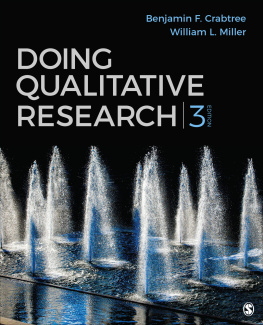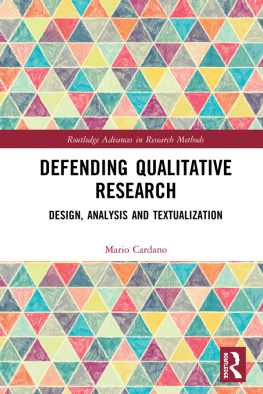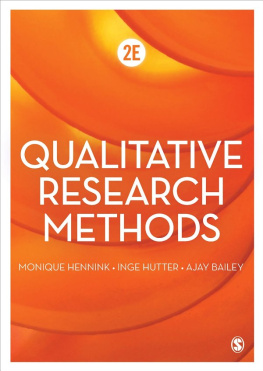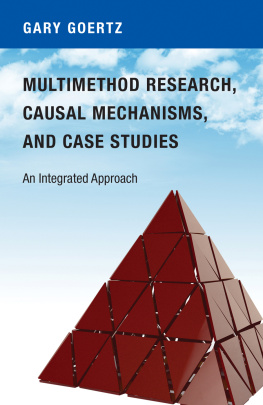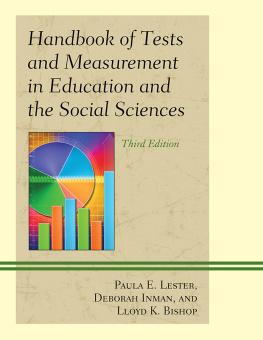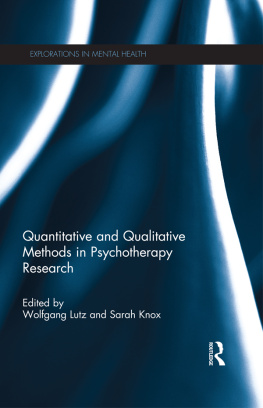Qualitative Comparative Analysis
Qualitative
Comparative
Analysis
An Introduction to
Research Design and
Application
Patrick A. Mello
2021 Georgetown University Press. All rights reserved. No part of this book may be reproduced or utilized in any form or by any means, electronic or mechanical, including photocopying and recording, or by any information storage and retrieval system, without permission in writing from the publisher.
The publisher is not responsible for third-party websites or their content. URL links were active at time of publication.
Library of Congress Cataloging-in-Publication Data
Names: Mello, Patrick A., author.
Title: Qualitative comparative analysis : an introduction to research design and application / Patrick A. Mello.
Description: Washington, DC : Georgetown University Press, 2021. | Includes bibliographical references and index.
Identifiers: LCCN 2021004429 | ISBN 9781647121440 (hardcover) | ISBN 9781647121457 (paperback) | ISBN 9781647121464 (ebook)
Subjects: LCSH: Social sciencesResearchMethodology. | Social sciencesStatistical methods.
Classification: LCC H62 .M38 2022 | DDC 300.72/1dc23
LC record available at https://lccn.loc.gov/2021004429
This paper meets the requirements of ANSI/NISO Z39.48-1992 (Permanence of Paper).
22 21 9 8 7 6 5 4 3 2 First printing
Printed in the United States of America
Cover design by Martha Madrid
Interior design by BookComp, Inc.
For Tanja, Henry, and Mara
Contents
Boxes, Figures, and Tables
BOXES
Tobias Ide |
Matthew A. Andersson and Sarah K. Harkness |
Marij Swinkels |
Leanne Giordono, Hilary Boudet, and Alexander Gard-Murray |
Pablo Castillo-Ortiz |
Maria Brockhaus, Jenniver Sehring, Kaisa Korhonen-Kurki, and Monica Di Gregorio |
Tim Haesebrouck |
FIGURES
TABLES
Preface
As you begin this book, you may be asking what Qualitative Comparative Analysis (QCA) is all about, or what this method can do that other methods cannot. Or you may already know about QCA, but you are unsure whether you can make it work in your own research.
There is no silver-bullet method for all research inquiries in the social sciences. Yet QCA has several distinct strengths that set it apart as a method. Foremost is its ability to account for causal complexity. This means that cases are seen as configurations that entail various combinations of conditions (conjunctural causation). Causal complexity further acknowledges that outcomes can be reached through multiple, different pathways (equifinality). Conjunctural causation and equifinality both resonate with many of the social phenomena that we care about in the social sciences. At the same time, conjunctural causation calls into question the utility of exploring the net effect of individual variables without taking into account their interaction, whereas equifinality challenges the assumption that similar outcomes must be rooted in similar causes.
Another strength of QCA is the methods analytical protocol, which gives researchers the tools for systematic comparison across the included cases, while also taking into account the logically possible combinations that have not (yet) been instantiated empirically. The latter are so-called logical remainders, and QCA offers the tools to systematically address these and also to engage in counterfactual reasoning where plausible expectations about potential cases with certain characteristics exist.
Finally, QCA gives researchers generous flexibility in adapting the method to their own research needs. Surely, a certain number of comparable cases is required. But beyond that, the method can be applied in small-N settings of about 12 cases or it can be used for medium-N and large-N comparisons of dozens or hundreds of cases. This gives the researcher much more flexibility than with quantitative methods and allows for easier comparison of a large number of cases than other qualitative methods. Moreover, for the set-theoretic calibration, the method can equally draw on qualitative and quantitative data, and there are a variety of different approaches and variants to suit all kinds of research aims.
This book is designed for students and researchers in the social sciences. I am a political scientist with a focus on international relations. This may show in some of the examples that I am using, but I have also made an effort to draw on a broader repertoire of empirical applications. To foster this aim, I have asked a number of colleagues from sociology, law, public policy, environmental governance, political geography, political science, and international relations for reflections on their own QCA studies, based on their published work. I am grateful for their contributions, and hope that you will find the examples helpful when working on your own QCA applications.
Acknowledgments
This book emerged from working with QCA and teaching the method over a number of years in various contexts. When starting my PhD at Humboldt University in Berlin, Klaus Eders research design course introduced me to Charles Ragins Fuzzy-Set Social Science, even before I read his The Comparative Method. Looking back, I can see how these books had a formative influence on my PhD project, which later became Democratic Participation in Armed Conflict, and how they influenced my thinking about comparative methods. A series of QCA workshops followed, with Sigurd Vitols at HU Berlin; Claudius Wagemann at the Berlin Graduate School of Social Sciences (BGSS); with Benot Rihoux and Carsten Schneider at the ECPR Summer School of Methods and Techniques in Ljubljana, where Ingo Rohlfing joined the course for a session on combining QCA and case studies; and eventually with Charles Ragin at the Institute for Qualitative and Multi-Method Research (IQMR) at Syracuse University. In parallel, I took courses on concept formation with Gary Goertz, also at IQMR in Syracuse, and on case study research methods by Andrew Bennett at the Oslo Summer School in Comparative Social Science Studies. I want to thank these teachers and mentors, without whom this book would not exist. I am also grateful for the opportunities provided to me by the BGSS and the funding of a PhD stipend by the German Research Foundation (DFG).
In 2013, Carsten Schneider asked whether I would like to join him as co-instructor for the QCA course at the ECPR Summer School, based on his Set-Theoretic Methods for the Social Sciences, coauthored with Claudius Wagemann. For the next four years, I taught the first week of the two-week long course, initially at the University of Ljubljana and later at Central European University in Budapest. I benefited enormously from this, including the many engaging discussions with our course participants, and I am grateful to Carsten for giving me the opportunity. During this time, the course was assisted by Priscilla lamos-Concha and Ioana-Elena Oana, while Adrian Dua joined in 2014 to introduce his QCA package for R. Thanks to Nena and Priscilla for their assistance with the course and to Adrian for his support in 2014 and for patiently answering all sorts of questions about the QCA package since then. Based on her work on the SetMethods package, Nena provided a first-rate introduction to R in the QCA course and this greatly enhanced my own transition to R, as I had previously worked mostly with the fs/QCA software. I also want to thank Eugne Horber who invited me to teach at the Swiss Summer School in Social Science Methods in Lugano, where I have been giving QCA courses since 2016.


